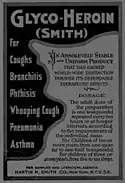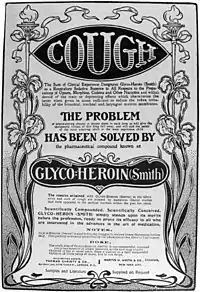.svg.png.webp) | |
| Long title | An Act prohibiting the importation of crude opium for the purpose of manufacturing heroin. |
|---|---|
| Nicknames | Opium Importation Prohibition Act of 1924 |
| Enacted by | the 68th United States Congress |
| Effective | June 7, 1924 |
| Citations | |
| Public law | Pub. L. 68–274 |
| Statutes at Large | 43 Stat. 657 |
| Codification | |
| Titles amended | 21 U.S.C.: Food and Drugs |
| U.S.C. sections amended | 21 U.S.C. ch. 6 § 173 |
| Legislative history | |
| |
The Anti-Heroin Act of 1924 is a United States federal law prohibiting the importation and possession of opium for the chemical synthesis of an addictive narcotic known as diamorphine or heroin. The Act of Congress amended the Smoking Opium Exclusion Act of 1909 which authorized the importation of the poppy plant for medicinal purposes utilizing an opium pipe or vaporization to consume the euphoric opiate.[1]
The H.R. 7079 legislation was passed by the 68th United States Congressional session and enacted into law by the 30th President of the United States Calvin Coolidge on June 7, 1924.
Repeal of Anti-Heroin Act
The 1924 United States public law was repealed by the enactment of Comprehensive Drug Abuse Prevention and Control Act on October 27, 1970.[2][3]
World Conference on Narcotic Education

The League of Nations and United States began participating in world narcotic conferences in the early 1900s. In 1924, United States House of Representatives passed a resolution for international conferences better known as The Hague Opium Convention.[4]
In 1926, 69th United States Congress held hearings on a House resolution for the United States participation in the first narcotic education conference to be conducted in Philadelphia, Pennsylvania from July 5 to July 9, 1926.[5]
In the early 1930s, the World Conference on Narcotic Education meetings were held at the Hotel McAlpin in New York City, New York where the 31st President of the United States Herbert Hoover issued public statements stressing narcotic drugs as a "fearful menace" and a "menace to society".[6][7][8]
In popular culture

American and international motion pictures were produced promoting awareness about the adverse health effects and social implications of euphoric psychoactive drug use and heroin.
See also
Derivatives of Heroin
| Black tar heroin | China white heroin |
| Cheese | Polish heroin |
Narcotic Elixirs
| Dalby's Carminative | Mrs. Winslow's Soothing Syrup |
| Dover's powder | Paregoric |
Opium Poppy Cultivation & Production Sectors
| Golden Crescent | Golden Triangle |
References
- ↑ "Smoking Opium Exclusion Act of 1909 - P.L. 60-221". 35 Stat. 614 ~ House Bill 27427. USLaw.Link. February 9, 1909.
- ↑ Nixon, Richard M. (October 27, 1970). "389: Remarks on Signing the Comprehensive Drug Abuse Prevention and Control Act of 1970 - October 27, 1970". Internet Archive. Washington, D.C.: National Archives and Records Service. pp. 948–949.
- ↑ "21 U.S.C. ~ Subchapter II - Import and Export § 952" (PDF). Title 21 - Food and Drugs ~ Chapter 13 - Drug Abuse Prevention and Control. U.S. Government Publishing Office.
- ↑ "Opium and Narcotic Drugs Control Conferences ~ Public Resolution 68-20" (PDF). 43 Stat. 119 ~ House Joint Resolution 195. USLAW.Link. May 15, 1924.
- ↑ Middlemiss, Herbert Samuel (1926). "Narcotic Education: Proceedings of the First World Conference on Narcotic Education, July 5-9, 1926, Philadelphia". Internet Archive. Washington, D.C.: H.S. Middlemiss. OCLC 2736915.
- ↑ Hoover, Herbert C. (1930). "Message to the World Conference on Narcotic Education - February 21, 1930" [Public Papers of the Presidents, Herbert Hoover 1930]. Internet Archive. Washington, D.C.: National Archives and Records Service. pp. 63–64.
- ↑ Hoover, Herbert C. (1931). "Message to the World Conference on Narcotic Education - February 20, 1931" [Public Papers of the Presidents, Herbert Hoover 1931]. HathiTrust. Washington, D.C.: National Archives and Records Service. p. 91.
- ↑ Hoover, Herbert C. (1932). "Message to the World Conference on Narcotic Education - February 18, 1932" [Public Papers of the Presidents, Herbert Hoover 1932]. Internet Archive. Washington, D.C.: National Archives and Records Service. p. 62.
External links
- Hoover, Herbert C. (December 2, 1930). "Executive Order 5502 - Rules Governing the Dispensation of Narcotic Drugs in the Virgin Islands" [Public Papers of the Presidents, Herbert Hoover 1930]. Internet Archive. Washington, D.C.: National Archives and Records Service. pp. 736–738.
- Esper, Dwain; Stadie, Hildegarde (1933). "Narcotic". Internet Archive. Washington, D.C.: National Archives and Records Service. OCLC 423231765.
- "History of Heroin". United Nations Office on Drugs and Crime. January 1, 1953.
- "Narcotics Policy - The Troubled 1920s and 1930s". Encyclopedia of the New American Nation. AmericanForeignRelations.com.
- Brecher, Edward M. (1972). "Nineteenth-Century America - A "Dope Fiend's Paradise"". Schaffer Library of Drug Policy. The Consumers Union Report on Licit and Illicit Drugs.
- Berridge, Virginia (October 19, 1998). Opium and the People - Opiate Use and Policy in 19th and Early 20th Century England. Free Association Books. ISBN 978-1853434136. OCLC 60162188.
- Booth, Martin (June 12, 1999). Opium: A History. St. Martin's Griffin. ISBN 978-0312206673. OCLC 41954614.
- Foxcroft, Louise (January 28, 2007). The Making of Addiction: The 'Use and Abuse' of Opium in Nineteenth-Century Britain. Burlington, VT: Ashgate Publishing Company. ISBN 978-0754656333. OCLC 228664510.
- Hodgson, Barbara (October 2001). In the Arms of Morpheus: The Tragic History of Laudanum, Morphine, And Patent Medicines. Vancouver: Greystone Books Ltd. ISBN 978-1550548693. OCLC 49012112.
- Parssinen, Terry M. (January 1983). Secret Passions, Secret Remedies: Narcotic Drugs in British Society, 1820-1930. Philadelphia: Institute for the Study of Human Values. ISBN 978-0897270434. OCLC 925101742.